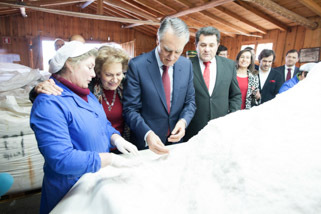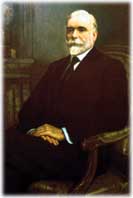
 António José de Almeida
António José de Almeida
Born on 27 July 1866 in Vale da Vinha, municipality of Penacova.
In December 1910 he married Maria Joana Queiroga de Almeida and they had one daughter.
Died on 31 October 1929 in Lisbon.
PROFESSIONAL ACTIVITY
Studied in Coimbra and graduated in Medicine in 1895 from Coimbra University with the grade of 15 (out of a maximum of 20).
Despite these results he was forbidden to practise as faculty professor Lopes Vieira had proposed to the University board that the student António José be prevented from doing so. The denunciation of the professors’ conservative attitude, published in 200 pages of Desforra, failed to alter this decision.
In 1896 he left for Angola and after a short stay there settled in São Tomé, where he practised medicine for seven years. At the same time he promoted the Associação Pró-Pátria with the aim of aiding the repatriation of European settlers.
He returned to Lisbon on 22 July 1903 and travelled through France, training at various clinics in Paris.
On his return to Portugal he opened his consulting rooms in Rua do Ouro after which he moved to Praça de Camões, 6, 1st floor, where he became known as the poor people’s doctor. Although he continued practising medicine he was more famous as a politician.
POLITICAL CAREER
His political activity began early at university. During this first phase, the following events should be highlighted:
Following the events of 5 October 1910 his political activity increased:
ELECTIONS AND PRESIDENTIAL PERIOD
António José de Almeida was elected President of the Republic at the Congress session of 6 August 1919, after three ballots.
The first had 181 candidates and obtained the following results:
António José de Almeida 87 votes
Manuel Teixeira Gomes 12 votes
Afonso Costa 3 votes
Azevedo e Silva, Duarte Leite, Magalhães Lima and Correia Barreto each had one vote.
Blank 2
The second had 179 candidates and obtained the following results:
António José de Almeida 93 votes
Manuel Teixeira Gomes 83 votes
Blank 2
One list contained the name of António Teixeira Gomes and was not considered.
Finally, the third with 167, gave António José de Almeida 123 votes, Manuel Teixeira Gomes 31 votes, and produced 13 blank votes.
He took office on 5 October of that year and swore his oath before Congress.
During his presidency he experienced some happy times such as the visit to Portugal of the King and Queen of the Belgians and the Prince of Monaco, the voyage of Gago Coutinho and Sacadura Cabral, the high point being his visit to Brazil between 17 August and 27 September 1922 during the commemorations of the centenary of that young country. None of this was enough, however, to allow him to forget the extremely troubled times lived in Portuguese society.
As the major backdrop there was the typhoid epidemic which in 1919 caused more than 2000 deaths.
Socially, strikes were the order of the day. Telephone and cork industry workers in January 1920. In March, railway, post office and tobacco workers. In September, again the railway workers. In January 1921, there was a general strike of press workers that lasted about four months. In February 1922, a transport workers strike and a strike of the fish canning industry workers of Setúbal, and in August of that year a general strike against the cost of living, following by many others throughout 1923.
Examples of acts of revolutionary rebellion are the events of 19 October 1922 with the deaths of António Granjo, head of government, and Machado Santos and Carlos da Maia. Elections followed each other in rapid succession: May 1919, July 1921 and January 1922.
Lastly, the governments. Discounting Sá Cardoso’s government, which continued to 21 January 1920, António José de Almeida swore in sixteen heads of government.
Between 21 January 1920 and 2 March 1921 there were seven. Domingos Pereira, António Maria Baptista, José Ramos Preto, António Maria da Silva, António Granjo, Álvaro de Castro and Liberato Pinto.
In 1921 another six were sworn in. Bernardino Machado, Barros Queirós, António Granjo, Manuel Maria Coelho, Maia Pinto and Cunha Leal. 1922 was reserved for three governments under António Maria da Silva, signifying a period of calm.
In the midst of this confusion, aided by the disagreements between political leaders, the military’s presence in government was increasingly accepted, a foretaste of the events of 28 May.
POST-PRESIDENTIAL ACTIVITIES
Having been replaced in his position by Manuel Teixeira Gomes on 5 October 1923 he continued to work on the newspaper República.
Troubled by gout he spent his last years in a wheelchair and died on 31 October 1929, just before being installed as Grand Master of the Freemasons to which he had been elected.
A statue by the sculptor Leopoldo de Almeida and the architect Pardal Monteiro was erected in Lisbon in his memory.
PRINCIPAL WORKS
He wrote manifestos, articles, letters, interviews and mainly speeches. An inspired off-the-cuff speaker, he became famous for his speeches in particular those at the funerals of Rafael Bordalo Pinheiro and José Falcão, in Parliament and during his visit to Brazil. These can be consulted in the book entitled 40 Anos da Vida Literária e Política, Lisbon, J. Rodrigues e Companhia, 1934.
© 2006-2016 Presidency of the Portuguese Republic
You have gained access to the records of the Official Site of the Presidency of the Republic from 9 March 2006 to 9 March 2016.
The contents available here were entered in the site during the 10 year period covering the two mandates of President of the Republic Aníbal Cavaco Silva.